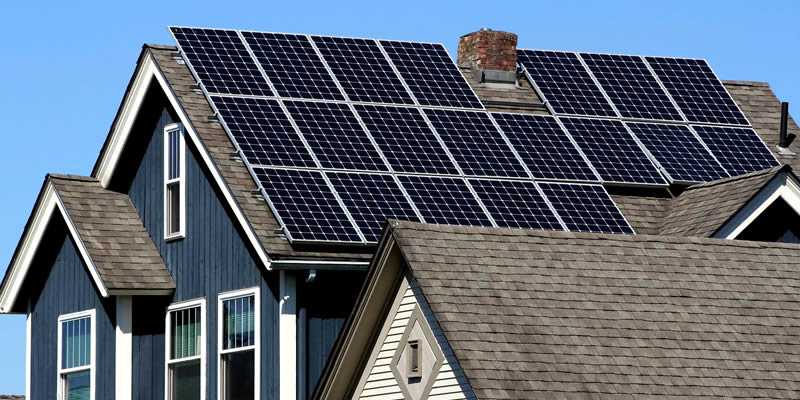Residential solar panels are transforming how homeowners generate and consume energy. With the rising cost of electricity and growing concerns about environmental sustainability, solar power has emerged as a reliable and eco-friendly alternative. Residential solar panels enable households to harness the sun’s energy, significantly reducing utility bills and contributing to a greener planet.
What Are Residential Solar Panels?
Residential solar panels are photovoltaic (PV) systems designed to convert sunlight into electricity for household use. These panels are typically installed on rooftops and are composed of individual solar cells that generate direct current (DC) electricity. Through an inverter, this DC electricity is converted into alternating current (AC) electricity, which powers homes and appliances.
How Residential Solar Panels Work
The operation of residential solar panels is simple yet innovative. Solar cells within the panels absorb sunlight, initiating a chemical reaction that produces electricity. This energy is directed to an inverter, which transforms it into usable power. Any excess energy produced can be stored in a battery system for later use or fed back into the grid, often earning credits through net metering programs.
Benefits of Installing Residential Solar Panels
Installing residential solar panels offers numerous advantages, including financial savings and environmental benefits. By generating your electricity, you can significantly lower or even eliminate your utility bills. Solar panels also increase property value and provide energy independence, protecting homeowners from fluctuating electricity prices. On an environmental level, solar panels reduce carbon emissions and reliance on fossil fuels, helping combat climate change.
Factors to Consider Before Installing Residential Solar Panels
Before investing in residential solar panels, it’s essential to evaluate your home’s suitability. Key considerations include the amount of sunlight your property receives, the condition and orientation of your roof, and your household’s energy needs. Financial factors, such as upfront costs, potential savings, and available incentives, should also be carefully assessed.
Types of Residential Solar Panels
Residential solar panels come in three main types: monocrystalline, polycrystalline, and thin-film. Monocrystalline panels are known for their high efficiency and sleek design, making them a popular choice among homeowners. Polycrystalline panels are more affordable but slightly less efficient. Thin-film panels are lightweight and flexible, making them ideal for unconventional roof designs or areas with limited space. Each type has its own set of advantages, catering to different energy needs and budgets.
Solar Panel Installation Process
The installation of residential solar panels involves several steps. It begins with a site assessment to determine the best system design for your property. Once approved, the panels are mounted onto your roof or another suitable surface, followed by wiring and connection to an inverter. The final step involves testing the system and obtaining necessary permits to connect it to the grid. Working with experienced installers ensures a smooth and efficient process.
The Role of Solar Inverters and Batteries
Solar inverters and batteries are critical components of a residential solar system. Inverters convert the energy generated by solar panels into usable electricity for your home. Batteries, on the other hand, store excess energy for later use, providing a backup during power outages or at night when the sun isn’t shining. Together, they enhance the reliability and efficiency of solar power systems.
Cost of Residential Solar Panels
The cost of the best solar company in USA has dropped significantly over the past decade, making solar energy more accessible than ever. The total expense depends on factors like system size, panel type, and installation complexity. However, federal and state incentives, such as the Investment Tax Credit (ITC), can offset a significant portion of the cost. Many companies also offer financing options, allowing homeowners to adopt solar power without substantial upfront investments.
Government Incentives for Residential Solar Panels
Government incentives play a crucial role in promoting the adoption of solar energy. The federal Investment Tax Credit (ITC) allows homeowners to deduct a percentage of their solar installation costs from federal taxes. Many states also offer additional incentives, including rebates, grants, and net metering programs. These incentives make residential solar panels a financially attractive option for homeowners.
Environmental Impact of Residential Solar Panels
Switching to solar energy reduces dependence on nonrenewable resources like coal and natural gas. Residential solar panels significantly lower greenhouse gas emissions and contribute to cleaner air and water. By generating electricity through renewable energy, homeowners play an active role in combating climate change and protecting natural ecosystems.
Challenges of Residential Solar Panel Adoption
Despite their benefits, residential solar panels come with challenges, including high initial costs and dependence on sunlight. However, advancements in technology and the availability of financing options have made solar energy more accessible. Additionally, modern battery storage solutions address concerns about energy availability during cloudy days or nighttime hours.
Future Trends in Residential Solar Panels
The future of residential solar panels is bright, with ongoing innovations improving efficiency and affordability. Bifacial panels, which capture sunlight from both sides, and solar shingles, which blend seamlessly with roofs, are gaining popularity. Advances in energy storage and smart grid technologies will further enhance the performance of residential solar systems, making solar energy a central component of sustainable living.
How to Choose the Best Residential Solar Panels
Selecting the best residential solar panels involves comparing efficiency, durability, and warranty terms. Researching customer reviews and company reputations can provide valuable insights into the quality of products and services. Consulting with a professional solar installer ensures you choose a system tailored to your energy needs and budget.
Summery
Residential solar panels are a game-changer for homeowners seeking to reduce their energy bills and environmental impact. With financial incentives and technological advancements making solar power more accessible, now is the perfect time to invest in renewable energy. By choosing the right solar system for your home, you can enjoy long-term savings, increased property value, and the satisfaction of contributing to a sustainable future.









